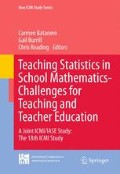Abstract
The aim of this chapter is to discuss the usefulness of case analysis as a resource for statistics teacher education. In order to ground the discussion, two illustrations of teacher preparation through case analysis are introduced, one of which describes a case discussion among a group of prospective secondary mathematics teachers in the Mid-Atlantic United States of America and the other a teaching research activity among a group of practising junior high school teachers in Guangzhou, China. The dynamics of case discussions from these two different environments indicated that cases can help participants consider factors in general pedagogical knowledge, content-specific pedagogical knowledge, and content knowledge. Some recommendations for further research and use of case analysis in teacher education are also included.
Access this chapter
Tax calculation will be finalised at checkout
Purchases are for personal use only
References
Batanero, C., Biehler, R., Maxara, C., Engel, J., & Vogel, M. (2005, May). Using simulation to bridge teachers’ content and pedagogical knowledge in probability. Paper presented at the ICMI Study 15 Conference: The Professional Education and Development of Teachers of Mathematics, Aguas de Lindoia, Brazil.
Gilovich, T. R., Vallone, R., & Tversky, A. (1985). The hot hand in basketball: On the misperception of random sequences. Cognitive Psychology, 17, 295–314.
Grossman, P. (2005). Research on pedagogical approaches in teacher education. In M. Cochran-Smith & K. M. Zeichner (Eds.), Studying teacher education: The report of the AERA Panel on Research and Teacher Education (pp. 425–476). Mahwah, NJ: Erlbaum.
Groth, R. E. (2007). Analysis of an online case discussion about teaching stochastics. Mathematics Teacher Education and Development, 7, 53–71.
Groth, R. E. (2008). Navigating layers of uncertainty in teaching statistics through case discussion. In C. Batanero, G. Burrill, C. Reading, & A. Rossman (2008).
Han, X. (2007, November). Learning with colleagues through public lessons. Paper presented at The World Association of Lesson Studies International Conference (WALSIC) 2007, Hong Kong. Online: www.ied.edu.hk/wals/website/
Huang, R., Peng, S., Wang, L., & Li, Y. (2010). Secondary mathematics teacher professional development in China. In F. K. S. Leung & Y. Li (Eds.), Reforms and issues in school mathematics in East Asia (pp. 129–152). Rotterdam: Sense Publishers.
Jones, G., Langrall, C., & Mooney, E. (2007). Research in probability: Responding to classroom realities. In F. Lester (Ed.), Second handbook of research on mathematics teaching and learning (Vol. 2, pp. 909–955). Charlotte, NC: Information Age Publishing and National Council of Teachers of Mathematics.
Jones, M. G., & Vesilind, E. (1995). Preservice teachers’ frameworks for class management. Teaching and Teacher Education, 11, 313–330.
Lampert, M., & Ball, D. L. (1998). Teaching, multimedia, and mathematics: Investigations of real practice. New York: Teachers College Press.
Larkey, P., Smith, R., & Kadane, J. (1989). It’s okay to believe in the “hot hand”. Chance, 2(4), 22–30.
Lecoutre, M. P. (1992). Cognitive models and problem spaces in “purely random” situations. Educational Studies in Mathematics, 23, 557–568.
Lewis, C. C. (2002). Lesson study: A handbook of teacher-led instructional change. Philadelphia: Research for Better Schools.
Markovits, Z., & Smith, M. (2008). Cases as tools in mathematics teacher education. In D. Tirosh & T. Wood (Eds.), The international handbook of mathematics teacher education (Vol. 2, pp. 39–64). Rotterdam: Sense Publishers.
Masami, M. (2007, November). A review of lesson study in Japan. Paper presented at The World Association of Lesson Studies International Conference (WALSIC) 2007, Hong Kong. Online: www.ied.edu.hk/wals/website/ Retrieved on: May18, 2011
McGraw, R., Lynch, K., Koc, Y., Budak, A., & Brown, C. A. (2007). The multimedia case as a tool for professional development: An analysis of online and face-to-face interaction among mathematics pre-service teachers, in-service teachers, mathematicians, and mathematics teacher educators. Journal of Mathematics Teacher Education, 10, 95–121.
Merseth, K. K. (1991). The case for cases in teacher education. Washington, DC: American Association of Colleges for Teacher Education.
Merseth, K. K. (2003). Windows on teaching math: Cases of middle and secondary classrooms. New York: Teachers College Press.
Shaughnessy, J. M. (1992). Research in probability and statistics: Reflections and directions. In D. A. Grouws (Ed.), Handbook of research on mathematics teaching and learning (pp. 465–494). New York: Macmillan and National Council of Teachers of Mathematics.
Shaughnessy, M. (2007). Research on statistics learning and reasoning. In F. Lester (Ed.), Second handbook of research on the teaching and learning of mathematics (Vol. 2, pp. 957–1009). Charlotte, NC: Information Age Publishing and National Council of Teachers of Mathematics.
Shulman, L. S. (1987). Knowledge and teaching: Foundations of the new reform. Harvard Educational Review, 57(1), 1–22.
Tversky, A., & Kahneman, D. (1971). Belief in the law of small numbers. Psychological Bulletin, 76(2), 105–110.
Xu, S., Yi, L., Yongdong, L., Bangquan, T., & Reisheng, P. (2008). A teacher training case in junior high schools of Guangzhou. In C. Batanero, G. Burrill, C. Reading, & A. Rossman (2008).
Author information
Authors and Affiliations
Corresponding author
Editor information
Editors and Affiliations
Rights and permissions
Copyright information
© 2011 Springer Science+Business Media B.V.
About this chapter
Cite this chapter
Groth, R.E., Xu, S. (2011). Preparing Teachers Through Case Analyses. In: Batanero, C., Burrill, G., Reading, C. (eds) Teaching Statistics in School Mathematics-Challenges for Teaching and Teacher Education. New ICMI Study Series, vol 14. Springer, Dordrecht. https://doi.org/10.1007/978-94-007-1131-0_35
Download citation
DOI: https://doi.org/10.1007/978-94-007-1131-0_35
Published:
Publisher Name: Springer, Dordrecht
Print ISBN: 978-94-007-1130-3
Online ISBN: 978-94-007-1131-0
eBook Packages: Humanities, Social Sciences and LawEducation (R0)

